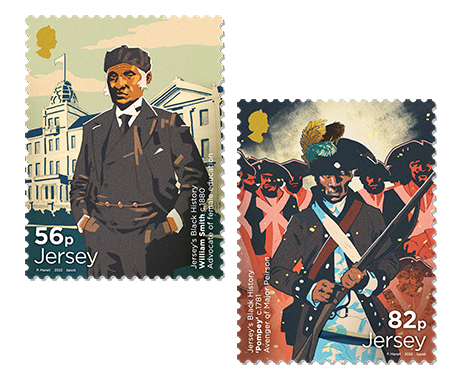Jersey's Black History - Pocket Money Set
£1.38
This pocket money set features the local letter and UK priority stamp from our 'Jersey's Black History' issue. South African artist Pola Maneli hilights individuals who played a part in Jersey's Black History with his powerful illustration style.
The Pocket Money Set includes just the Local Letter and UK Letter tariffs (where available) for each new issue, making it an affordable choice, particularly for our young collectors.
All our mint/cto products are carefully prepared by our own team and supplied in glassine bags to ensure you receive them in pristine condition.
| Date of issue | 20-10-2022 |
| Withdrawal date | 20-10-2024 |
| Printer | bpost, Belgium |
| Size | Stamp die size 40mm x 30mm |
| Process | four colour process offset lithography plus litho metallic gold ink |
| Denominations | 56p, 82p |
Additional Information
William Smith - Advocate of Female Education
Born in Ghana in 1816, William was the illegitimate son of a Yorkshireman and a local chieftain’s daughter. An active member of the anti-slavery movement in Sierra Leone, over 33,000 slaves were freed under his leadership. After moving to Jersey with his family in the 1870s, he became a lay preacher and a passionate advocate of female education. He was one of the founding members of the Jersey Ladies’ College.
‘Pompey’ - Avenger of Major Peirson
A single black figure is central to John Singleton Copley’s 1783 painting of the Battle of Jersey ‘The Death of Major Peirson’ which represents a key moment during the failed 1781 French invasion of the Island. Often referred to as ‘Pompey’, he returns fire, killing the French sniper. Information surrounding his real-life inspiration is vague. He is the only black figure in the painting; an unusual example from the time of a black figure being portrayed in such a prominent and heroic way.
Additional Information
William Smith - Advocate of Female Education
Born in Ghana in 1816, William was the illegitimate son of a Yorkshireman and a local chieftain’s daughter. An active member of the anti-slavery movement in Sierra Leone, over 33,000 slaves were freed under his leadership. After moving to Jersey with his family in the 1870s, he became a lay preacher and a passionate advocate of female education. He was one of the founding members of the Jersey Ladies’ College.
‘Pompey’ - Avenger of Major Peirson
A single black figure is central to John Singleton Copley’s 1783 painting of the Battle of Jersey ‘The Death of Major Peirson’ which represents a key moment during the failed 1781 French invasion of the Island. Often referred to as ‘Pompey’, he returns fire, killing the French sniper. Information surrounding his real-life inspiration is vague. He is the only black figure in the painting; an unusual example from the time of a black figure being portrayed in such a prominent and heroic way.
















